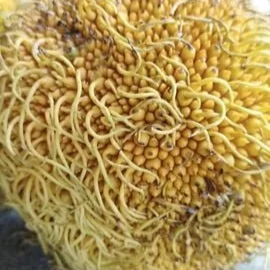 Image 1 of 3
Image 1 of 3

 Image 2 of 3
Image 2 of 3

 Image 3 of 3
Image 3 of 3




Artocarpus Sericarpus
Artocarpus sericarpus, known as peluntan, pedalai, gumihan, or terap bulu, is a tropical evergreen tree in the Moraceae family, closely related to jackfruit and breadfruit. Native to Borneo, the Philippines, the Maluku Islands, and Sulawesi, it grows primarily in tropical evergreen forests at elevations between 500–1,000 meters and is sometimes found on steep, clay-rich inland hillsides. The tree can reach up to 40 meters tall and has large, dark green, oval leaves measuring 20–70 cm in length. The bark is gray to brown and is sometimes used for woodcraft. Supporting leaves near the fruit (stipules) are 6–12 cm long and shaped like the tip of a pole.
The fruit of A. sericarpus is round, about 15 cm in diameter, and covered in soft orange hairs, giving it the look of a giant rambutan. When ripe, the flesh is white, very sweet, and considered by some to be the best-tasting among all Artocarpus species. Unlike its cousin A. odoratissimus (terap), the fruit has a mild aroma, making it more palatable to those sensitive to strong-smelling tropical fruits. The seeds are edible when boiled or roasted and can be eaten like nuts.
Seeds are sold in packs of 1, shipped in humid vermiculite.
Artocarpus sericarpus, known as peluntan, pedalai, gumihan, or terap bulu, is a tropical evergreen tree in the Moraceae family, closely related to jackfruit and breadfruit. Native to Borneo, the Philippines, the Maluku Islands, and Sulawesi, it grows primarily in tropical evergreen forests at elevations between 500–1,000 meters and is sometimes found on steep, clay-rich inland hillsides. The tree can reach up to 40 meters tall and has large, dark green, oval leaves measuring 20–70 cm in length. The bark is gray to brown and is sometimes used for woodcraft. Supporting leaves near the fruit (stipules) are 6–12 cm long and shaped like the tip of a pole.
The fruit of A. sericarpus is round, about 15 cm in diameter, and covered in soft orange hairs, giving it the look of a giant rambutan. When ripe, the flesh is white, very sweet, and considered by some to be the best-tasting among all Artocarpus species. Unlike its cousin A. odoratissimus (terap), the fruit has a mild aroma, making it more palatable to those sensitive to strong-smelling tropical fruits. The seeds are edible when boiled or roasted and can be eaten like nuts.
Seeds are sold in packs of 1, shipped in humid vermiculite.

